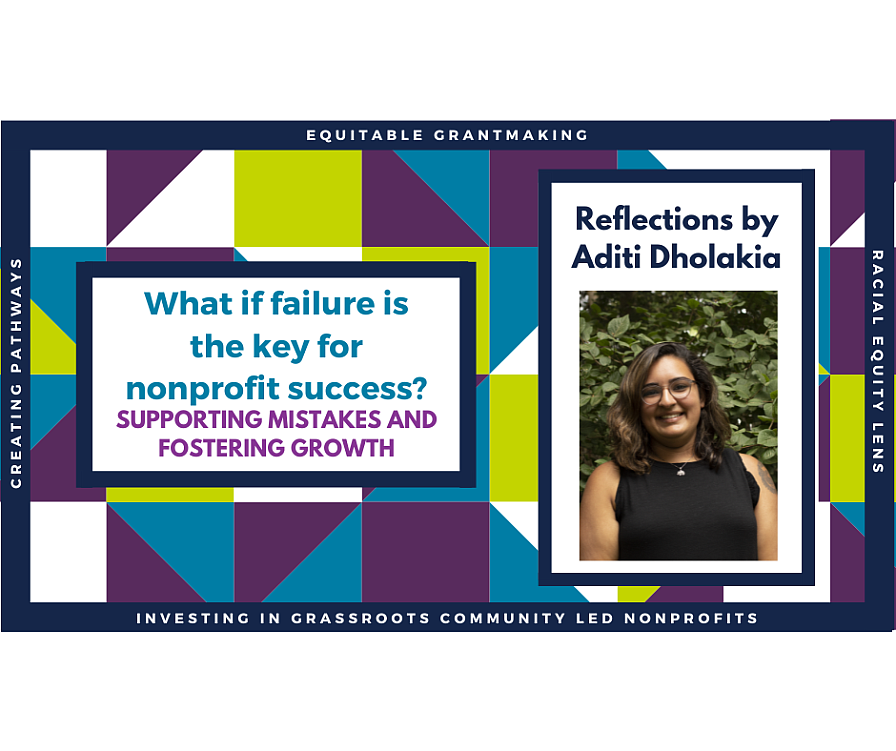
Note from the author: It is clear that the tides of philanthropy are shifting, hopefully in the direction of equity and inclusion in a way that benefits not only grassroots, community-led nonprofits, but also foundations and funding entities. Increasing parts of the sector are recognizing the importance of meaningful relationships as foundational to moving toward lasting change. Fostering genuine, supportive, trust-based partnerships between funders and grantees is key to fostering an environment that not only celebrates success and growth, but also makes space for learning and growth as a result of mistakes, or dare I say, failure. - Aditi
A common misconception in our society is that failure is the polar opposite — the antithesis — of success. This couldn’t be further from the truth. Failure is a natural, required part of life. It is an integral component of learning, growth, and — most importantly — success. There are few things in life that we execute perfectly on the first try; this is certainly true for me, and it’s also true for humans generally, from infancy onward.
Babies learning how to walk rarely do so without falling (and failing) a few times. In school, kids are taught history — a subject that essentially chronicles failures across the world and through time, such that newer generations learn which mistakes not to repeat (and which ones ultimately led to success). Even the most learned individuals cannot escape fallibility, and why would they want to? I learn more from mistakes, missteps, and failures, than I do when something goes smoothly on the first try.
You might be wondering why this is relevant. In today’s nonprofit industrial complex model, nonprofits are continuously expected to successfully prove their value and impact as justification for being deserving of funding and support.
There are several reasons why nonprofit organizations are rarely, if ever, given the leeway to fail, learn, and grow from their mistakes. One of the primary causes at the root is perspective. The bulk of nonprofit organizations and grassroots community initiatives exist to serve pressing needs amongst folks who have the least support from or access to resources that can help them to grow and thrive. These are on-the-ground endeavors steeped in community empowerment as a stepping stone to larger scale systemic changes.
Despite how close to the ground the work is, the funding and support for it invariably comes from people who sit high in the sky, unaware of the intricacies of the work. By the nature of the sector, funders’ perspectives (often guided by their own business acumen, and economic and social structures steeped in capitalism) leave little to no room for failure on the ground level.
While it is true that funders of all types often hold expertise on the subject of money distribution and management, there is one key flaw in applying investors’ lenses to the nonprofit sector. That is, nonprofits are by definition not businesses. Rather, they are vital anchors for community support and growth, and therefore cannot be forced to fit the mold and expectations of a competitive, investment/market-based approach.
The reality is that grassroots, community-led nonprofit organizations are typically established to bridge a gap, or meet a pressing need in the community — work that has its foundations in the systemic failure to address those needs. It is the job of the people who hold power and distribute resources, to embrace that reality, and allocate resources through listening to and learning from community leaders.
At SIF, our programming has held a particularly strong focus on trust. Our speaker events, Council meetings, and one-on-one conversations have all repeatedly emphasized the importance of placing genuine, unrestricted trust in the grassroots organizations doing integral work to support and grow their communities. We have learned that in order to create a space where innovation can not only occur, but flourish, we must make sure the people leading that work feel safe enough to fail as a part of growth.
We in Funder Education recognize that in order for this learning to be meaningful and impactful, it must be a precursor to intentional, tactical action. It is our goal to shift our programming such that we can get at the specifics — the nitty gritty details — of implementing change in the philanthropic sector. In this endeavor we, too, will embrace failure as a key component of growth and movement-building.
At the end of the day, a failure is only a true failure if one is not given the grace, support, or opportunity to learn, advance, and flourish as a result.
 Social Innovation Forum
Social Innovation Forum